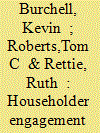| Srl | Item |
| 1 |
ID:
150361


|
|
|
|
|
| Summary/Abstract |
The provision of energy consumption feedback on in-home displays (IHDs) has a prominent role in government strategies for domestic energy demand reduction. Research suggests that IHDs can support energy consumption reduction, but also that engagement with IHDs can be limited to men and is often short-term. In this paper, we draw on research carried out in Smart Communities, a two-year project in which electricity and gas consumption feedback played a key role. This study was distinctive because it was accompanied by a weekly email communications programme and was provided within the context of community action. Project findings suggest that, although by no means panaceas, approaches such as these can support long-term engagement with energy consumption feedback, including by women, and can support behaviour change.
|
|
|
|
|
|
|
|
|
|
|
|
|
|
|
|
| 2 |
ID:
125815


|
|
|
|
|
| Publication |
2013.
|
| Summary/Abstract |
One of the many barriers to the incorporation of local and community actors in emerging energy governance structures and policy delivery mechanisms is the lack of thorough understanding of how they work in practice, and how best to support and develop effective local energy governance. Taking a meso-level perspective and a network approach to governance, this paper sheds some new light on this issue, by focusing on the relation, channels of communication and interactions between low carbon community groups (LCCGs) and other actors. Based on data gathered from LCCGs in Oxfordshire, UK, via network survey and interviews the research maps the relations in terms of the exchanges of information and financial support, and presents a relation-based structure of local energy governance. Analysis reveals the intensity of energy related information exchanges that is taking place at the county level and highlights the centrality of intermediary organization in facilitating information flow. The analysis also identifies actors that are not very dominant in their amount of exchanges, but fill 'weak-tie' functions between otherwise disconnected LCCGs or other actors in the network. As an analytical tool the analysis could be useful for various state and non-state actors that want to better understand and support - financially and otherwise - actors that enable energy related local action.
|
|
|
|
|
|
|
|
|
|
|
|
|
|
|
|